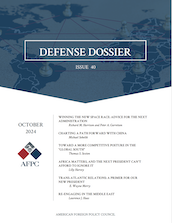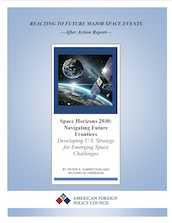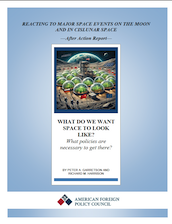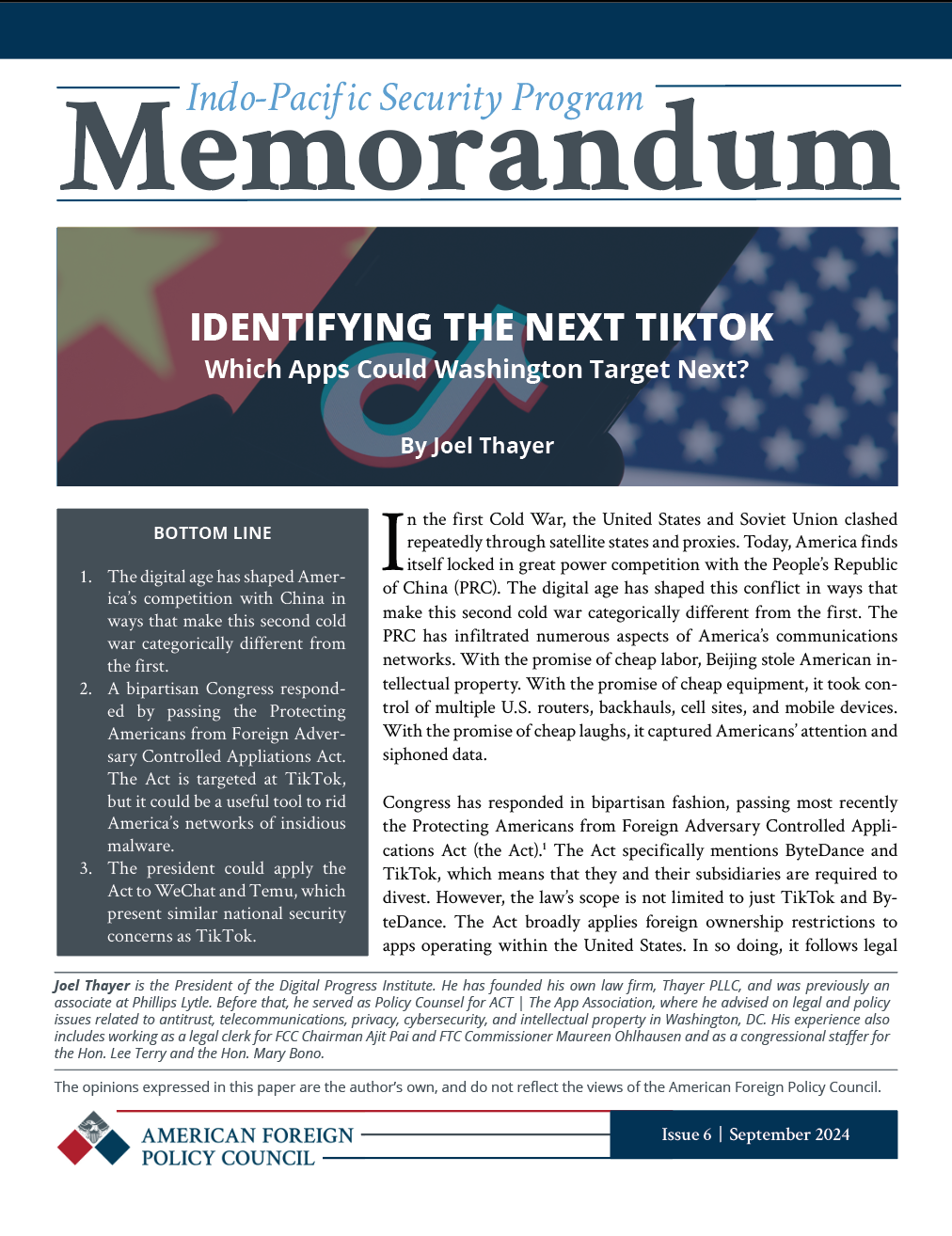Resource Security Watch No. 58
How Hamas profits from humanitarian aid;
The Ukraine war and global food security;
Zambian drought deepens energy crisis
How Hamas profits from humanitarian aid;
The Ukraine war and global food security;
Zambian drought deepens energy crisis

Winning the New Space Race: Advice for the Next Administration
Charting a Path Forward with China
Toward A More Competitive Posture in the “Global South”
Africa Matters, and the Next President Can't Afford to Ignore It
Trans-Atlantic Relations: A Primer for Our New President
Re-Engaging in the Middle East
Putin's Neo-Soviet penal system;
A new ally for Putin in the Eurozone?;
A helping hand from Pyongyang...;
...Reshuffles the Ukrainian battlefield...;
...And spurs a rethink in Seoul
Up next: satellites for real-time target tracking;
China's hypersonic edge;
How to optimize quantum communications;
Toward military-grade 3D printings;
Vortex cannon capabilities
In recent years, the Biden administration has promoted the need for “resilient, diverse, and secure supply chains” and urged the identification of vulnerabilities that could affect the country’s national security. Interestingly, one of the most visible components in the nation’s supply chain—ocean shipping—matches this description yet is rarely afforded the attention it deserves. That’s a costly mistake because Chinese state-owned shipping is thoroughly embedded in and integrated within the logistics infrastructure of the United States and the West more broadly.
These are decisive days in Tbilisi. On October 26th, voters in the country of Georgiawent to the polls to cast their ballots in a pivotal parliamentary vote. The results of that contest have sent shockwaves through the country and beyond, and raised profound concerns about Georgia’s democratic future.
All eyes are now on next week’s highly-anticipated, and hotly contested, national election. In recent days, we’ve witnessed a flurry of media reports about how malign actors like Russia, China and Iran are seeking to shape U.S. political discourse ahead of that pivotal vote.
What Ukrainians think matters most;
New World Bank, EU funds headed for Kyiv;
Tokyo backs Kyiv's judiciary reform bid;
A fire sale in Kyiv
Russian malign actors exploit Ukrainian war anxiety...;
...As London targets Russian disinfo actors;
The Hamas-Al-Jazeera connection;
An enduring ISIS propaganda threat
In early October, Chechen leader Ramzan Kadyrov declared a blood feud against three North Caucasian federal lawmakers, accusing them of plotting his assassination amid a power struggle over the Wildberries e-commerce platform.
For almost a year, Israel has been actively at war against terrorists on several fronts. And despite international pressure, adversary propaganda, and the sheer difficulty of the fight, Israel is gradually winning.
PRC hackers target the phones of Trump and Harris staff;
China, India reach border deal;
CPC tightens controls on scholars;
China, Vatican extend Bishop appointment deal;
Taiwan rejects South Africa's demand to move its office
A new Russian means of subversion;
A grim deficit;
Russia's new, "patriotic" textbooks;
How Russia subverted Georgia
In order for the US to proactively shape the contours of the debate within the Iranian opposition it needs to lay out what sort of government it wants in Tehran, and its expectations of the actors that will play a part in bringing about this change. And, given the growing indicators that the Islamic Republic is approaching a fundamental political and social transition, the sooner Washington does so, the better.
Britain’s Chagos gamble sparks fears of Chinese influence;
Tensions rise in the horn;
War toils on in Sudan…;
…As Washington sanctions RSF leader;
Nigerians protest “anti-poor” World Bank recommendations;
South Sudan’s presidential power play
A low-cost bomb boosts U.S. maritime power;
Future-proofing encryption;
Surveillance, like a shark;
Biosecurity concerns grow as gene editing advances;
Self-training robots – a national security risk?

In the Fall of 2023, Iranians from all walks of life took to the streets to vent their rage at their country’s ruling clerical regime. The immediate cause for their anger was the September 2022 death of 22-year-old Mahsa Amini at the hands of regime security forces for the crime of improperly wearing her Islamic headscarf, or hijab. Quickly, however, what began as grassroots unrest over regime brutality transformed into something more: a fundamental rejection of the Islamic Republic’s religious system of government. And as the protests went on, hopes rose in the West that they might, at long last, coalesce into a real challenge to the country’s four-plus decades of draconian clerical rule.
At present, Chinese coercion is met largely with a playbook of defensive measures. The Chinese are able to choose the time and location of their action, and the recipient country busies itself scrambling to contain the fallout. China therefore has the initiative, while the targeted country — often in conjunction with the U.S. — mostly tries to mitigate the impact. As a result, it’s tempting to assume that China holds more cards than it actually does. And it’s equally easy for the U.S. to forget the extent of its own leverage over China in the exact same manner.
Former prisoner: Putin's regime will invariably collapse;
Moscow and Beijing collude on European espionage...;
...As Russia stirs up trouble in Britain;
The true cost of the Ukraine war, continued

This report details the outcomes of a series of high-stakes, seminar-style wargames conducted by a simulated National Space Council (NSpC) to address potential near-term space-related scenarios that could significantly impact U.S. public perception, resourcing, and policy.
Energy jitters in Tehran;
A political wave of pardons;
Iran's new president faces student discontent;
Iran's bloody eastern border
It is hard to think of a United Nations agency with a more glaring failure in its core mission than the United Nations Interim Force in Lebanon, more commonly known as UNIFIL — and there has certainly been no shortage of contenders this year.
While global leaders pressure Israel to explain its plans for Gaza after its war with Hamas ends, Palestinian leaders are doing their own planning for that day – and recent developments on that front should raise concerns about prospects for long-term peace between Israel and a future government in Gaza.
Hong Kong installs thousands of surveillance cameras;
Teachers and public sector workers must hand in their passports;
Beijing gives local governments $28 billion to meet targets;
Baloch suicide bomber kills 2 Chinese near Karachi airport;
China’s Chery assembles cars in Russian plants vacated by Western rivals
Violence surges anew in India's Manipur;
The Tapi gets a new lease on life;
Another win for the Taliban;
Decision time in J&K
Three jailed for sedition mark the end of free speech in Hong Kong;
U.S. Coast Guard tracks Chinese, Russian vessels off the Alaskan coast;
China spends $2 billion per month on Iranian oil;
U.S. concerned about China's lending to indebted countries;
South Korea probes China’s manipulation of public opinion
Russia’s demographic crisis continues;
Surging drone production...;
...Gets a helping hand from Beijing;
Moscow incentivizes criminal enlistment...;
...And fields a "grandpa" army;
Viktor Bout is back - and helping Moscow meddle in the Mideast
Israel Mulls Its Iran Options: With considerable trepidation, the Middle East, and indeed the wider world, is awaiting Israel’s response to Iran’s massive October 1st missile barrage on the Jewish state. The White House, fearful of a wider regional war, is exerting massive (albeit mostly quiet) pressure for Jerusalem to limit its retaliation to something “proportionate” that doesn’t target either Iran’s nuclear program or its energy sites.
As the war in Ukraine heads toward its third anniversary, the question on the minds of many Americans is, why do the Ukrainians keep fighting? The conventional wisdom argues that after nearly three years of killing, the war must end — something possible only through the surrender of Ukrainian land occupied by Russian forces. Yet polls consistently find that nearly 70% of Ukrainians oppose ceding land for peace. Why? Because giving up land means surrendering to life under Russian occupation. Ukrainians know from history what that means; to prevent it, they are willing to endure the deaths of thousands more of their soldiers and the destruction of many of their cities and towns.
Portable EW systems boost troops;
The Army prepares for 2040 warfare;
Cloud-based supercomputers for the Pentagon;
3D printing takes off... in space;
China eyes laser subs for space warfare
It is now – even amid a bitter presidential campaign – that U.S. leaders should stand four-square behind Israel, giving it the leeway to protect itself as it sees fit rather than adding to the morally confused carping from abroad.
The Taliban's expanding international profile;
Palestinian public opinion begins to shift, finally;
Islamism surges in Somalia;
Flashpoint: West Africa
Whoever ends up winning the White House next month will need to reframe the way America thinks about Great Power Competition in order to adequately respond to the collective threat now posed by Moscow, Beijing, and Tehran. Doing so will begin by answering a fateful question—Is the United States still prepared to serve as the "arsenal of democracy"?
Thinking creatively about penalizing Russia;
Trouble in the Russian oil trade;
Moscow meddles in Armenia;
Russia is running out of resources
Harsh justice following failed Congo coup;
Islamist violence flares in Bamako…;
…As U.S. special forces make their way back to Chad;
Nigeria’s APC ekes out a political win;
In Burkina Faso, civilian casualties surge…;
…And conspiracy theories abound;
Clearing the political decks in Tanzania
During the vice presidential debate between Gov. Tim Walz (D-MN) and Sen. J.D. Vance (R-OH), viewers in the People’s Republic of China experienced a broadcast interruption. When the CBS moderators asked Gov. Walz about discrepancies regarding his story of being in China during the Tiananmen Square massacre in 1989, the video feed throughout China cut to an error screen. This “error” was, of course, the latest instance of Chinese Communist Party (CCP) censors silencing speech about sensitive topics within China.
A Houthi headache...;
...Amid muddled U.S. policy;
Sweden and Turkey turn the page;
Islamist trouble in Russia's heartland
A quid pro quo for Tehran: nuclear assistance;
A tussle over Tbilisi's political direction;
A scandal in Chisinau;
Moscow's ominous new nuclear doctrine

This report details the outcomes of a series of high-stakes, seminar-style wargames conducted by a simulated National Space Council (NSpC) to address potential near-term space-related scenarios that could significantly impact U.S. public perception, resourcing, and policy.
A step forward for the Kremlin in Africa;
The limits of Turkish support;
NATO beefs up arctic defenses against Russia;
Russia counterattacks in Kursk;
How Russian education is suffering
U.S. disrupts vast PRC hacking operation;
Fiji calls in Australia to thwart PRC hackers;
U.S. to ban Chinese software, hardware in vehicles;
As births fall and the economy slows, dairy farms swim in milk;
China fines PWC $62 million for auditing Evergrande
No country for journalists;
Iran's cyber-warriors target Iraq;
The long arm of the regime;
Tehran focuses on Israel's eastern flank;
New Iranian missiles for Moscow...;
...and a fresh framework for bilateral cooperation
Another casualty of Russia's war;
Putin swells the size of Russia's military...;
...And updates its nuclear posture
On Sept. 4, China’s Ministry of Civil Affairs announced that China would no longer carry out foreign adoption work, except for a few narrow exceptions. In turn, the U.S. Department of State notified American families, many of whom had already been matched with children in China years ago and were just waiting to bring their kids home.
With this devastating announcement, China has nullified the bond that American families had with their waiting children. For the families affected, it is a waking nightmare. For the U.S., it is the latest failure of Washington to tame the worst impulses of the Chinese Communist Party.
Ex-CIA officer who spied for China is sentenced to 10 years;
U.S. companies see record-low profits in China, cut investment;
ROK military removes PRC-made cameras from military bases;
Germany sails first warships through Taiwan Strait in 22 years;
China provides training and funds for Myanmar junta police
Ukraine’s Kursk offensive roils Russia's African presence;
UN accuses SAF and RSF of war crimes, calls for peacekeepers;
Mpox cases soar in Africa;
GERD dam a flashpoint between Ethiopia and Egypt;
A fraught election in Algiers
Bangladesh frees terror leader...;
...As worries swirl over Dhaka's direction;
Germany expels Iranian religious leader;
A Hamas rebound in northern Gaza?;
Jordan's new political balance;
Preparing for a northern front
Turkey turns up the heat;
Russia blocks YouTube, finally;
Hamas weaponizes war messaging...;
...And manipulates Palestinian public opinion

Congress passed the Protecting Americans from Foreign Adversary Controlled Applications Act (the Act). The Act specifically mentions ByteDance and TikTok, which means that they and their subsidiaries are required to divest. However, the law's scope is not limited to just TikTok and ByteDance. The Act broadly applies foreign ownership restrictions to apps operating within the United States. Specific attention is given in this paper to WeChat and Temu.
Nationalist sentiment, regional divisions resurface;
Russia's youth rage against the war machine;
Nervous in Norway;
Europe draws a red line...;
...As Moscow leans into its alliance with Tehran